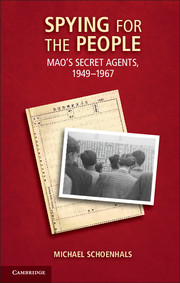3 - The Recruitment Base
Where Utility Trumps Class
Published online by Cambridge University Press: 05 January 2013
Summary
“As you all know,” officer cadets were told in the Central People's Public Security Academy in 1957, “agents are secretly recruited from all social strata, and include party and Youth League members, revolutionary masses, backward elements, as well as elements of the hostile classes and tewu elements. There are some of them who can be trusted politically, some who cannot altogether be trusted, and even some who are altogether untrustworthy and for whom special measures have to be devised for the sake of making controlled use of them.” As this observation suggests, the reality of the agent–officer relationship was some distance removed from the class struggle fare that the CCP was feeding China's population at large. It provided no easily actionable answer to the questions posed in the very first line of the first page of the Selected Works of Mao Zedong: “Who are our enemies? Who are our friends?”
The CCP would certainly have preferred under no set of circumstances to rely on hostile classes and tewu elements. But, as Mao had famously remarked in 1937, “practice is the criterion of truth,” and practice proved that there were, and seemingly always would be, times when the services of a coerced “class enemy” or turned enemy operative had to be relied upon to attain an operational goal. An agent recruited from within the ranks of the Communist Party's own membership or activist constituency was obviously preferable when a mission's goal entailed guarding critical assets and production processes. However, when a mission involved infiltrating a counterrevolutionary organization or “reactionary sects and societies,” activists rarely got very far before their covers were blown, for to be credible (as studies of the use of informers by the FBI have also shown), the agent had to share at least some of the key attributes of the group he or she was expected to work against. Stated with unusual forthrightness by a senior public security officer in the city of Zhengzhou, Henan province, the problem with activists was that, “needless to say, they are reliable and expedient, but not really suitable as penetration agents.”
- Type
- Chapter
- Information
- Spying for the PeopleMao's Secret Agents, 1949–1967, pp. 85 - 109Publisher: Cambridge University PressPrint publication year: 2013

